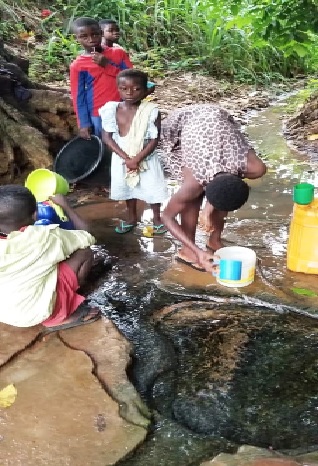
Ninting cries for water
Residents of Ninting in the Ashanti-Mampong Municipality are appealing to the government and philanthropists to come to their aid to provide them with potable water.
The residents said the need for potable water had become critical in the area in the face of the coronavirus (COVID-19) which required constant washing of hands with soap under running water.
Ninting is located in the Mampong Municipality just after the famous Mampong Scarp from the Kumasi direction of the Kumasi-Ejura road.
It is four kilometres to Asante Mampong and has a population of more than 1.5 million residents whose main occupations are crop farming and trading.
Water source
The residents who rely on two main sources of water from Ameselae and Nintinmu, have to walk for a long distance through the bush to fetch water.
A visit to the water sources by the reporter revealed a sorry state.
At Ameselae, it was observed that a shallow round hole had been dug on a rocky surface to create a small pool of water from two tributaries under a sloppy landscape with a canopy of plants serving as shade for protection.
The spring-like water body comes out of the rock and gathers in the crater that has been created by the residents and is then scooped to fill the containers and receptacles.
Due to the slow inflow of the water into the crater, it takes a while for the residents to fill their containers and only two people can scoop the water from the algae-ridden hole at a time.
Plea
In an interview, the Head of the Bretuo Royal Family of Ninting, Nana Adu Asare, said even though the community had appealed to some philanthropists to make the water sources safe and reliable, the efforts had not yielded the desired results.
Nana Adu Asare said all appeals made to state agencies, including the Mampong Municipal Assembly, have fallen on deaf ears.
He said the lack of potable water and the long distance that children had to walk for water had contributed to the late attendance of the pupils to school and a high number of water-borne diseases in the community.
This has compelled the Municipal Health Directorate to carry out an outreach programme in the community to educate the residents on how to treat the water before consuming to reduce the incidence of water-borne diseases in the area.
Nana Adu Asare, therefore, appealed to philanthropic individuals and corporate institutions, as well as non-profit organisations and multinational companies to come to the aid of the town to help protect lives.
